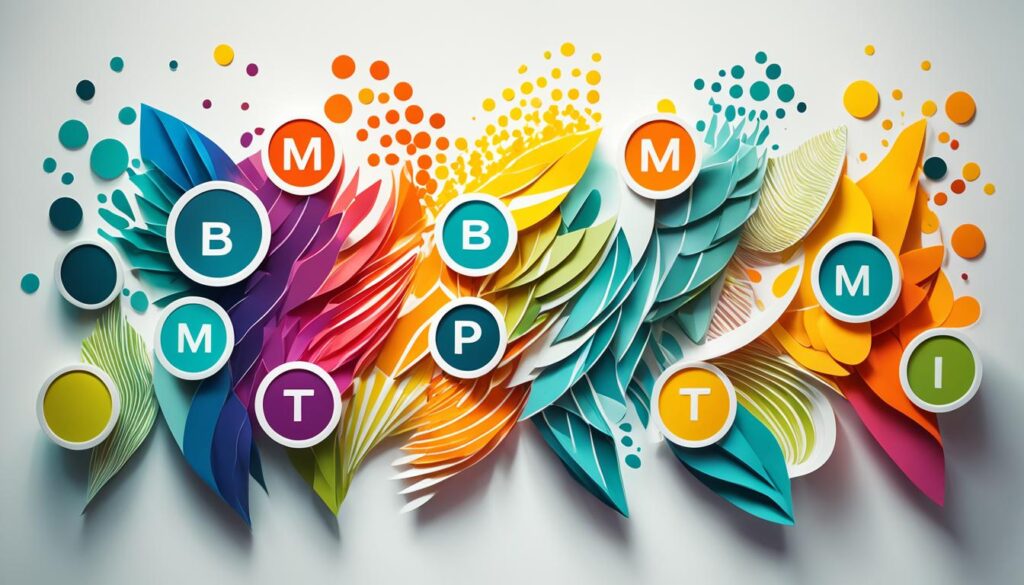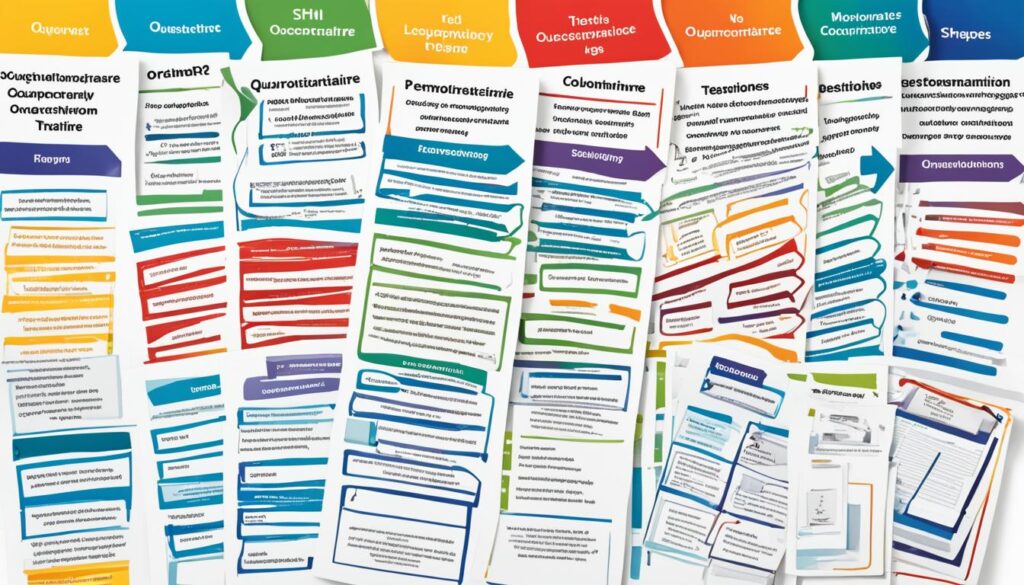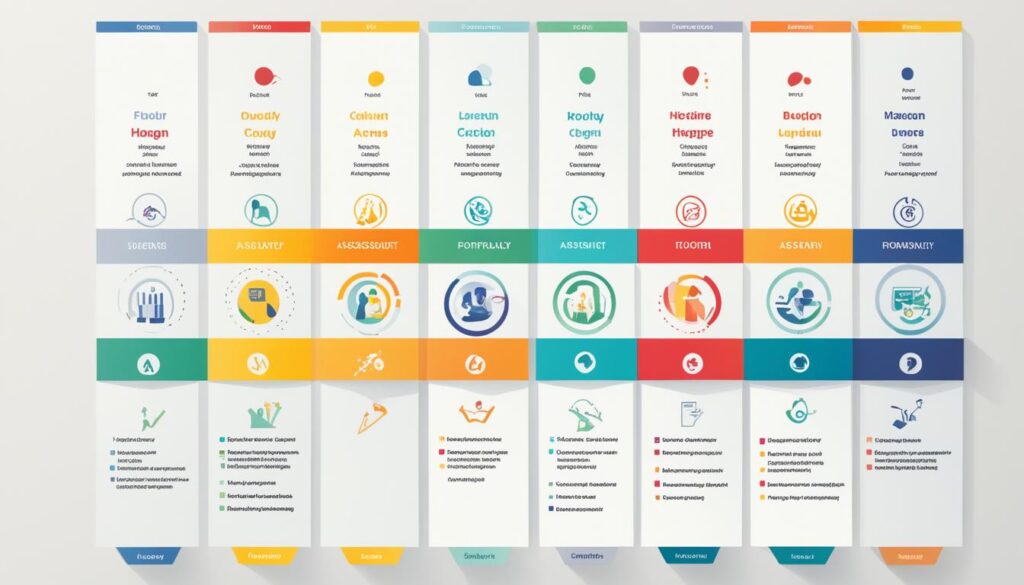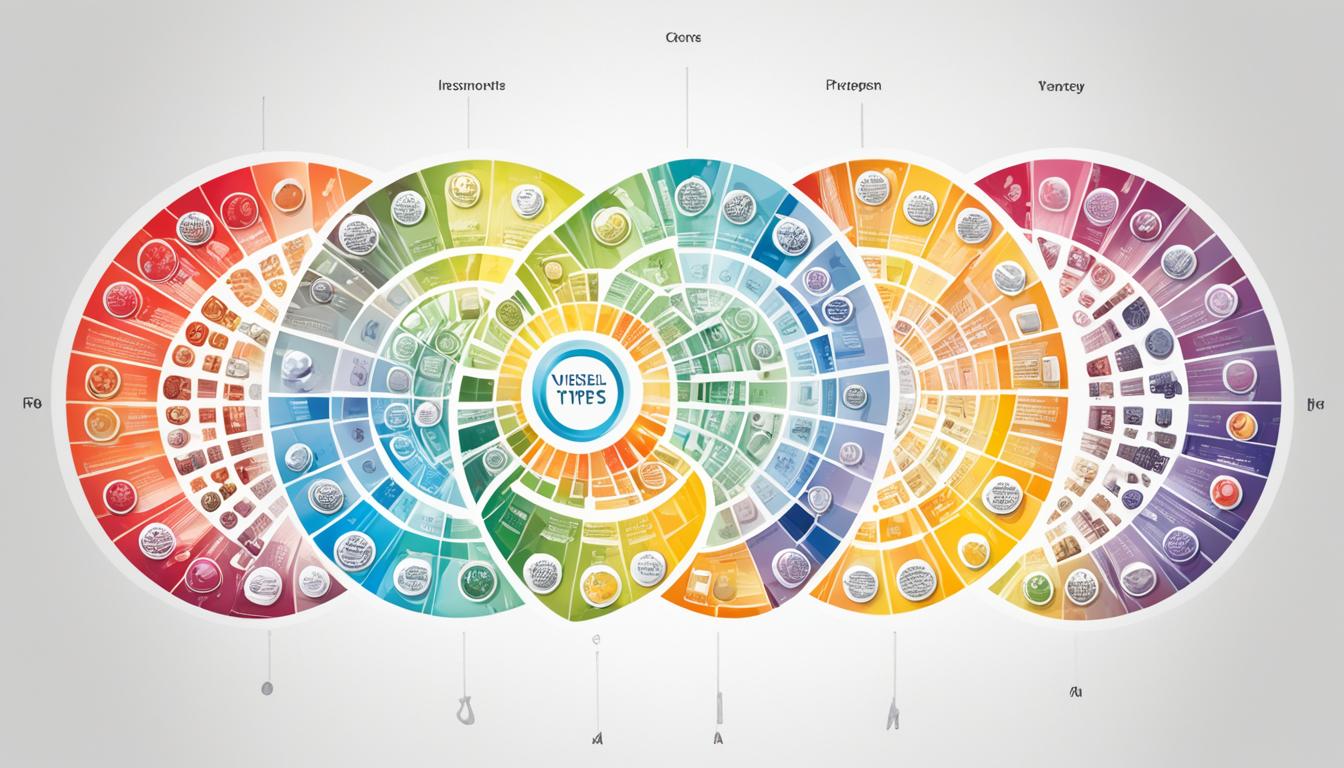Are you getting ready for a job interview that involves a personality test? You’re not alone. The Society for Human Resource Management (SHRM) reports that one-third of HR professionals are now incorporating personality assessment tests and pre-employment testing into the hiring process for executive positions. These tests are meant to assess your personality traits and determine if you are the most suitable candidate for a particular role.
While the idea of taking a personality test might sound daunting, it can actually work in your favor. By understanding the purpose of these tests and how to approach them effectively, you can increase your chances of acing the assessment and impressing your potential employer.
In this article, we will explore what pre-employment personality tests are and why they have gained popularity in the hiring process. We will also discuss common versions of these tests, such as the Caliper Profile, Myers-Briggs Type Indicator (MBTI), SHL Occupational Personality Questionnaire (OPQ32), Hogan Personality Inventory (HPI), and DiSC Behavior Inventory. Additionally, we will provide tips for passing a personality test and discuss the role of these tests in the overall hiring process.
So, if you want to gain a competitive edge in your job interview and ace the assessment, keep reading!
Key Takeaways:
- Personality tests are commonly used in job interviews to evaluate a candidate’s character traits and determine their suitability for a specific role.
- Pre-employment personality tests have gained popularity because they provide employers with quantifiable measures to make informed hiring decisions.
- Common versions of pre-employment personality tests include the Caliper Profile, Myers-Briggs Type Indicator (MBTI), SHL Occupational Personality Questionnaire (OPQ32), Hogan Personality Inventory (HPI), and DiSC Behavior Inventory.
- By answering honestly, being consistent, and practicing self-awareness, you can increase your chances of passing a personality test.
- Personality tests are just one aspect of the hiring process and do not determine your entire worth as a candidate. Focus on showcasing your skills, experience, and motivation during the interview process.
What is a Pre-Employment Personality Test?
A pre-employment personality test is a widely used assessment employed by employers to evaluate a candidate’s personality traits and determine their suitability for a specific role within the company. These tests aim to identify individuals who possess the right character traits and are likely to excel in the position, ultimately ensuring a good fit between the candidate and the organization.
Pre-employment personality tests provide valuable insights into an individual’s personality, allowing employers to make informed hiring decisions based on quantifiable measures. By assessing various aspects of a candidate’s personality, these tests offer a comprehensive overview of their strengths, weaknesses, and overall suitability for the desired position.
These assessments are typically delivered online, ensuring seamless and instant processing. The candidate’s results are then compared against a vast pool of other candidates to determine their fit within the organization.
A pre-employment personality test serves as an invaluable tool for employers, providing them with the means to evaluate a candidate’s potential cultural fit, work style, and overall compatibility with the desired role. By gaining insight into a candidate’s personality traits, employers can make more informed hiring decisions that result in higher employee engagement and productivity. Through the utilization of pre-employment personality tests, organizations can find candidates who are not only qualified but also possess the necessary character traits to thrive in their respective positions.
Why are Pre-Employment Personality Tests Popular?
Research indicates that matching an employee’s personality traits with their role leads to increased engagement and productivity. As a result, pre-employment personality tests have gained significant popularity among employers seeking to make informed hiring decisions. These tests offer quantifiable measures that enable organizations to assess the suitability of candidates for specific positions.
One of the key factors contributing to the popularity of pre-employment personality tests is their accessibility and efficiency. These tests are typically delivered online, allowing candidates to complete them remotely at their convenience. They are also processed instantaneously, providing immediate results for employers to evaluate. Furthermore, the ability to compare candidates against a large pool of applicants enhances the objectivity and reliability of the assessment process.
By employing pre-employment personality tests, employers can gain valuable insights into candidates’ personality traits, which can help determine their compatibility with the organization’s culture and values. These tests provide employers with a deeper understanding of candidates’ behavioral tendencies, communication styles, decision-making approaches, and preferred work environments.
Employers recognize that taking into account a candidate’s personality traits alongside their qualifications and experience can lead to more successful hires. By using pre-employment personality tests, employers can effectively assess a candidate’s potential alignment with the job requirements and the overall dynamics of the team. This holistic evaluation approach promotes more informed hiring decisions and increases the likelihood of candidates succeeding in their roles.
| Benefits of Pre-Employment Personality Tests for Employers |
|---|
| Enhanced hiring accuracy by evaluating candidate suitability beyond qualifications. |
| Improved cultural fit by aligning candidates’ personality traits with the organization’s values. |
| Reduced employee turnover by identifying candidates who will thrive in the role. |
| Increased team cohesion by selecting candidates with compatible personalities. |
Overall, the popularity of pre-employment personality tests stems from their ability to provide employers with valuable insights that go beyond traditional assessments. These tests enable organizations to make data-driven hiring decisions, increasing the chances of selecting candidates who are well-suited for the role and the company culture.

Common Versions of Pre-Employment Personality Tests
When it comes to pre-employment personality tests, there are several common versions that employers use to evaluate candidates. These tests provide valuable insights into an individual’s personality traits and help determine their fit for a specific role. Below are the five widely used versions of pre-employment personality tests:
The Caliper Profile
The Caliper Profile is designed to measure a candidate’s personality traits and how they relate to job performance. This test provides employers with a comprehensive overview of both positive and negative qualities, allowing them to assess a candidate’s compatibility with the position.
The Myers-Briggs Type Indicator (MBTI)
The Myers-Briggs Type Indicator categorizes individuals into 16 personality types based on their tendencies in four groupings: extraversion vs. introversion, intuition vs. sensing, thinking vs. feeling, and judging vs. perceiving. This test helps employers determine if a candidate’s personality aligns with the cultural and organizational values of the company.
The SHL Occupational Personality Questionnaire (OPQ32)
The SHL Occupational Personality Questionnaire evaluates candidates across 32 different characteristics. It provides employers with insights on how certain behaviors influence a candidate’s work performance. The test focuses on three main domains: relationship with people, thinking style and feelings, and emotions.
The Hogan Personality Inventory (HPI)
The Hogan Personality Inventory is based on the Five-Factor Model and measures an individual’s temperament. It assesses various scales and provides a score report that identifies a candidate’s likely behavior in specific circumstances. This test helps employers determine the compatibility of a candidate with the demands of the role.
The DiSC Behavior Inventory
The DiSC Behavior Inventory evaluates a candidate’s primary traits based on four personality types: dominant (D), influential (I), steady (S), and compliant (C). This assessment provides employers with insight into a candidate’s professional behavior style and their ability to work well within a team.
Each version of the pre-employment personality test has its own unique approach and measures different aspects of a candidate’s personality. By using these tests, employers can gain valuable insights into a candidate’s suitability for a role and make informed hiring decisions.

The Caliper Profile
The Caliper Profile is a pre-employment personality test that aims to measure an individual’s personality traits and their correlation to job performance. Unlike some other tests, the Caliper Profile provides a comprehensive overview of a candidate’s personality by examining both their positive and negative qualities. This holistic approach allows employers to gain valuable insights into a candidate’s suitability for a specific role.
The Caliper Profile evaluates various personality dimensions, including communication style, problem-solving approach, leadership potential, and work motivation. By analyzing these traits, employers can assess how well a candidate’s personality aligns with the requirements of the job, therefore predicting their potential performance in the workplace.
“The Caliper Profile evaluates personality traits to provide a comprehensive understanding of a candidate’s potential job performance.” – HR Manager, XYZ Company
The Caliper Profile goes beyond simple assessments of compatibility and provides employers with actionable data to inform their hiring decisions. This test is widely used by organizations across industries to identify candidates with the right personality traits that contribute to job success.
Measuring Personality Traits and Job Performance
The Caliper Profile assesses various dimensions of personality, including:
- Leadership potential
- Communication style
- Problem-solving approach
- Work motivation
- Interpersonal skills
- Adaptability
By exploring these aspects, the Caliper Profile helps employers gain a deeper understanding of a candidate’s behavioral tendencies and how they may impact their performance in the workplace. This comprehensive evaluation enables organizations to make informed decisions when selecting candidates who are likely to succeed in specific roles and contribute positively to the company’s overall success.
| Personality Traits | Job Performance |
|---|---|
| Strong leadership abilities | Positive effect: Effective team management and decision-making. |
| Excellent communication skills | Positive effect: Clear and efficient collaboration with colleagues and clients. |
| Problem-solving mindset | Positive effect: Ability to overcome challenges and find innovative solutions. |
| Intrinsic motivation | Positive effect: Drive and commitment to achieving professional goals. |
| Adaptable nature | Positive effect: Flexibility in handling changing work environments and demands. |
Through these insights, employers using the Caliper Profile can make more informed decisions about hiring and effectively match candidates with roles that align with their personality traits, leading to higher job satisfaction and performance.

The Myers-Briggs Type Indicator (MBTI)
The Myers-Briggs Type Indicator (MBTI) is a widely used personality assessment tool that categorizes individuals into 16 different personality types. It explores four key groupings: extraversion vs. introversion, intuition vs. sensing, thinking vs. feeling, and judging vs. perceiving. The MBTI is valued by employers as it helps determine if a candidate’s personality aligns with the company culture, ensuring a potential good fit for the organization.

Let’s take a deeper look at the four groupings and their impact on personality types:
Extraversion vs. Introversion
This grouping explores how individuals gain energy and interact with others. Extraverts (E) tend to be sociable, outgoing, and energized by being around people. Introverts (I), on the other hand, are more introspective, reserved, and gain energy from alone time.
Intuition vs. Sensing
The intuition vs. sensing grouping examines how individuals perceive and gather information. Those who lean towards intuition (N) focus on possibilities, ideas, and patterns, often emphasizing the big picture. Sensing (S) individuals, however, are more detail-oriented and rely on tangible, concrete information.
Thinking vs. Feeling
This grouping delves into how individuals make decisions and evaluate information. Thinkers (T) tend to be logical, objective, and prioritize facts when making choices. Feelers (F), on the other hand, focus on emotions, empathy, and subjective considerations when making decisions.
Judging vs. Perceiving
The judging vs. perceiving grouping explores how individuals approach the outside world. Judging (J) individuals prefer structure, organization, and planned approaches. They enjoy closure and thrive in predictable environments. Perceiving (P) individuals, on the other hand, are more adaptable, spontaneous, and open to possibilities.
Understanding the different personality types identified by the MBTI can help employers assess whether a candidate’s strengths, preferences, and behavioral patterns align with the requirements and culture of a specific role or organization. By leveraging the insights provided by the MBTI, employers can make informed hiring decisions that result in lasting employee satisfaction and success.
The SHL Occupational Personality Questionnaire (OPQ32)
The SHL Occupational Personality Questionnaire (OPQ32) is a widely used pre-employment personality test that provides valuable insights into a candidate’s work performance. This assessment measures 32 different characteristics and evaluates candidates in three main domains: relationship with people, thinking style and feelings, and emotions.
By assessing these core aspects of an individual’s personality, employers can gain a deeper understanding of how certain behaviors may influence a candidate’s work performance in a specific role. The OPQ32 helps companies make informed decisions about hiring candidates who possess the right set of traits and characteristics that align with the demands and expectations of the job.
The OPQ32 is designed to provide employers with a comprehensive evaluation of a candidate’s personality, enabling them to assess their suitability for the position and the company culture. It helps organizations identify individuals who are likely to excel in areas such as teamwork, leadership, problem-solving, and adaptability.
Here is an overview of the three main domains assessed by the SHL Occupational Personality Questionnaire:
Relationship with People
- The ability to work well with others and establish positive working relationships.
- Effective communication skills and the capacity for empathy.
- The level of assertiveness and ability to handle conflict.
Thinking Style and Feelings
- Cognitive abilities and problem-solving skills.
- Decision-making style and flexibility in thinking.
- Emotional stability and resilience in challenging situations.
Emotions
- Emotional intelligence and self-awareness.
- The ability to manage and regulate emotions.
- Adaptability to change and handling stress.
The SHL Occupational Personality Questionnaire offers employers a comprehensive evaluation tool to identify candidates who possess the necessary personality traits and characteristics for success in a specific role. By using this assessment, companies can ensure they make informed hiring decisions that align with their organizational values and promote optimal work performance.

The Hogan Personality Inventory (HPI)
The Hogan Personality Inventory (HPI) is a powerful tool that assesses an individual’s temperament and evaluates its compatibility with the requirements of a specific role. This assessment is based on the Five-Factor Model, which identifies five core dimensions of personality: openness, conscientiousness, extraversion, agreeableness, and emotional stability.
The HPI measures various scales to provide a comprehensive understanding of a candidate’s personality. It assesses traits such as ambition, sociability, curiosity, confidence, and resilience, among others. By analyzing these dimensions, employers can gain valuable insights into how a candidate’s personality may align with job performance and organizational culture.
The HPI produces a detailed score report that highlights a candidate’s likely behavior in specific circumstances. It enables employers to assess the candidate’s potential strengths, weaknesses, and areas for growth. This information allows organizations to make informed decisions during the hiring process and select candidates who are best suited for the role.
Employers value the Hogan Personality Inventory for its ability to predict job performance. Research has shown that certain personality traits have a significant impact on work-related behaviors and outcomes. By using the HPI, employers can identify candidates who possess the necessary characteristics for success in a particular position.

“The Hogan Personality Inventory provides valuable insights into a candidate’s suitability for a role. Its comprehensive assessment of personality traits helps employers make data-driven decisions, leading to better hiring outcomes and increased job performance.” – HR Manager
The DiSC Behavior Inventory
The DiSC Behavior Inventory is a widely used assessment that helps employers gain insights into a candidate’s primary traits based on four primary personality types: Dominant (D), Influential (I), Steady (S), and Compliant (C). This assessment provides valuable information about a candidate’s professional behavior style and their ability to work effectively as part of a team.
The DiSC Behavior Inventory focuses on understanding how individuals tend to behave in work-related situations. By identifying a candidate’s primary traits, employers can better assess their potential fit within an organization and their compatibility with specific roles.
The four primary traits measured by the DiSC Behavior Inventory are as follows:
- Dominant (D): Individuals with dominant traits tend to be direct, assertive, and results-oriented. They are often confident decision-makers and natural leaders.
- Influential (I): Individuals with influential traits are outgoing, enthusiastic, and persuasive. They excel at building relationships and are skilled at motivating others.
- Steady (S): Individuals with steady traits are even-tempered, patient, and cooperative. They are dependable team players who value stability and harmony in their work environments.
- Compliant (C): Individuals with compliant traits are detail-oriented, precise, and analytical. They prefer following established procedures and strive for accuracy and quality in their work.
The DiSC Behavior Inventory provides employers with valuable insights into how a candidate may approach tasks, interact with colleagues, and contribute to a team dynamic. It helps organizations make informed decisions about selecting individuals who align with their workplace culture and can thrive in specific roles.

Benefits of Pre-Employment Personality Tests for Job Seekers
Pre-employment personality tests offer several benefits to job seekers, providing them with valuable insights into their personality traits and helping them make informed decisions about their career paths.
Understanding Personality Traits and Aligning with Roles
By taking a pre-employment personality test, candidates can gain a deeper understanding of their own personality traits, including their strengths and weaknesses. This self-awareness can help them identify roles that align well with their natural tendencies and abilities.
For example, a candidate who demonstrates strong leadership qualities may thrive in a management position, whereas someone with excellent attention to detail may excel in a role requiring meticulous work.
Insights into Organizational Values and Culture
Pre-employment personality tests can also provide job seekers with valuable insights into an organization’s values and culture. These tests often measure traits related to teamwork, communication, and work style preferences, which can give candidates a glimpse into the type of environment they may be entering.
Understanding the cultural fit can be crucial for job satisfaction and long-term success. It allows candidates to evaluate whether their values align with those of the organization, promoting a more harmonious and fulfilling work experience.
Presentation: Image

Summary of Benefits
| Benefit | Description |
|---|---|
| Understanding Personality Traits | Helps candidates identify their strengths and weaknesses, enabling better alignment with job roles. |
| Alignment with Culture | Provides insights into an organization’s values and culture, enhancing job satisfaction and long-term success. |
By leveraging the insights gained from pre-employment personality tests, job seekers can make more informed decisions regarding their career choices, increase their chances of finding a fulfilling role, and thrive in their chosen profession.
Tips for Passing a Personality Test
Passing a personality test is crucial when seeking employment. It’s important to answer honestly while keeping the specific company and position in mind. To help you navigate this assessment successfully, here are some essential tips:
- Avoid sitting on the fence: When responding to questions, try to avoid choosing “neither agree nor disagree” too frequently. Instead, take a stance and provide answers that reflect your true opinions and beliefs.
- Consistency is key: Be consistent in your responses throughout the test. This means answering similar questions in a similar manner. Employers look for stability and reliability in their ideal candidates.
- Answer in a work context: Remember to frame your answers in the context of the workplace. Consider how your personality traits and behaviors may impact your job performance and interactions with colleagues.
- Practice self-awareness: Take the time to reflect on your own personality traits before taking the test. Understand your strengths and weaknesses, and how they may influence your work style. This self-awareness will help you provide genuine and accurate responses.
- Stay calm and focused: Personality tests can be overwhelming, but it’s crucial to remain calm and focused throughout the process. Take deep breaths, read the questions carefully, and don’t rush your answers. Taking your time will lead to more thoughtful and accurate responses.
- Don’t overthink: While it’s important to be thoughtful, avoid overanalyzing each question. Trust your instincts and provide your initial response. Overthinking can lead to inconsistency and confusion, which may not accurately represent your true personality.
By following these tips, you can increase your chances of passing a personality test with confidence. Remember, staying authentic and true to yourself is key.

The Role of Personality Tests in the Hiring Process
Personality tests play a significant role in the hiring process, providing employers with additional insights to evaluate a candidate’s suitability for a role. However, it’s essential to recognize that these tests are just one aspect of the overall assessment and should not solely determine a candidate’s worth.
Employers administer personality tests to gain a better understanding of a candidate’s behavioral tendencies, attitudes, and work styles. These assessments help identify individuals who possess the desired traits and characteristics that align with the job requirements and the company’s culture.
During the hiring process, it’s crucial for job seekers to focus on showcasing their skills, experience, and motivation through interviews, resumes, and other application materials. While personality tests provide valuable insights, they should not overshadow the importance of demonstrating qualifications and capabilities relevant to the job.
Ultimately, hiring decisions are based on a combination of factors, including the candidate’s personality, skills, experience, and cultural fit.
Understanding the Purpose of Personality Tests
Personality tests are designed to assess various aspects of an individual’s character, such as their communication style, problem-solving abilities, leadership potential, and adaptability. By evaluating these traits, employers can gain a deeper understanding of how candidates may perform in specific work environments and contribute to team dynamics.
It’s important to remember that personality tests are not foolproof indicators of job performance or future success. They provide insights that act as a supplement to other hiring criteria. Employers consider a holistic view of candidates, weighing their skills, experience, cultural fit, and performance during interviews and assessments.
The Benefits of Personality Tests for Employers
Personality tests offer several benefits for employers, including:
- Enhanced decision-making: Personality tests provide quantifiable data that helps employers make more informed hiring decisions, reducing the risk of selecting candidates who may not be a good fit for the job or the organization.
- Improved team dynamics: By understanding the personality traits and work styles of potential hires, employers can build strong teams with complementary skills and cohesive collaboration.
- Reduced turnover: Personality tests help identify candidates who align with the company’s values and culture, increasing the likelihood of employee satisfaction and reducing turnover rates.
It’s important for employers to use personality tests responsibly and ensure they are administered and interpreted ethically and without bias.
The Candidate’s Perspective
For job seekers, personality tests can provide insights into their own strengths, weaknesses, and work preferences. By understanding their personality traits, candidates can gain a clearer sense of their compatibility with specific roles and work environments.
However, it’s essential for candidates to approach personality tests with authenticity and avoid trying to manipulate the results. Honesty is key to ensuring a genuine assessment that accurately represents their character. It’s also crucial for candidates to remember that personality tests are just one piece of the puzzle and should not define their entire worth or chances of landing a job.

Conclusion
In today’s competitive job market, pre-employment personality tests have become a common component of the hiring process. Understanding these tests and how to approach them can significantly benefit job seekers. By following the tips mentioned in this article and being authentic in their responses, candidates can increase their chances of success in a job interview that includes a personality test.
These tests provide valuable insights into a candidate’s personality traits and how they align with the requirements of a specific role. By answering honestly and with the company’s values in mind, job seekers can showcase their suitability for the position. It is also important to note that personality tests are just one aspect of the hiring process and should not overshadow other important factors such as skills, experience, and motivation.
By preparing for a job interview that includes a personality test, candidates can gain a competitive edge. Familiarizing themselves with common versions of these tests and understanding the different traits they measure can help them respond effectively. Additionally, remaining calm, practicing self-awareness, and being consistent in their responses can further enhance their chances of success.
In conclusion, job seekers should view pre-employment personality tests as an opportunity to showcase their suitability for a position. By understanding these tests and following the tips provided, candidates can navigate the interview process with confidence and increase their chances of securing their desired job.
FAQ
What is a pre-employment personality test?
A pre-employment personality test is an assessment used by employers to evaluate a candidate’s personality traits and determine their suitability for a particular role.
Why are pre-employment personality tests popular?
Pre-employment personality tests have gained popularity because they provide employers with quantifiable measures to make informed hiring decisions. These tests are delivered online, processed instantaneously, and compared against thousands of other candidates.
What are some common versions of pre-employment personality tests?
Common versions of pre-employment personality tests include the Caliper Profile, Myers-Briggs Type Indicator (MBTI), SHL Occupational Personality Questionnaire (OPQ32), Hogan Personality Inventory (HPI), and DiSC Behavior Inventory.
How does the Caliper Profile assess personality traits?
The Caliper Profile measures an individual’s personality traits and how they correlate to job performance. It examines both positive and negative qualities of a candidate to provide a comprehensive overview of their personality.
How does the Myers-Briggs Type Indicator categorize individuals?
The Myers-Briggs Type Indicator categorizes individuals into 16 personality types based on their tendencies in four groupings: extraversion vs. introversion, intuition vs. sensing, thinking vs. feeling, and judging vs. perceiving. This test helps employers determine if a candidate would be a good cultural fit for a company.
What does the SHL Occupational Personality Questionnaire measure?
The SHL Occupational Personality Questionnaire measures 32 different characteristics to give companies insight into how certain behaviors influence a candidate’s work performance. It evaluates candidates in three main domains: relationship with people, thinking style and feelings, and emotions.
How does the Hogan Personality Inventory measure temperament?
The Hogan Personality Inventory is based on the Five-Factor Model and measures an individual’s temperament and how it matches the demands of a role. It evaluates various scales and provides a score report that identifies a candidate’s likely behavior in specific circumstances.
What does the DiSC Behavior Inventory measure?
The DiSC Behavior Inventory measures a candidate’s primary traits based on four personality types: dominant (D), influential (I), steady (S), and compliant (C). This assessment helps employers understand a candidate’s professional behavior style and their ability to work as part of a team.
What are the benefits of pre-employment personality tests for job seekers?
Pre-employment personality tests provide valuable information to job seekers. They can help candidates understand their personality traits, strengths, and weaknesses, and how they may align with a specific role. Additionally, these tests can offer insights into an organization’s values and culture, aiding in the decision-making process for job seekers.
What are some tips for passing a personality test?
To increase your chances of passing a personality test, it’s important to answer honestly while keeping the company and position in mind. Avoid sitting on the fence by not answering too many questions with “neither agree nor disagree.” It’s also important to be consistent in your responses and answer in a work context. Practice self-awareness, stay calm, and don’t overthink your answers.
What is the role of personality tests in the hiring process?
Personality tests are just one aspect of the hiring process and do not determine a candidate’s entire worth. They provide employers with additional information to assess a candidate’s suitability for a role. It’s important for job seekers to focus on showcasing their skills, experience, and motivation during the interview process.
How Can Personality Insights from a Test Help in Aceing a Job Interview?
Identifying personality insights from a test can give you a deeper understanding of your strengths and weaknesses, helping you present yourself more confidently in a job interview. Being aware of your personality traits can also guide you in effectively communicating your skills and relating to potential employers.









